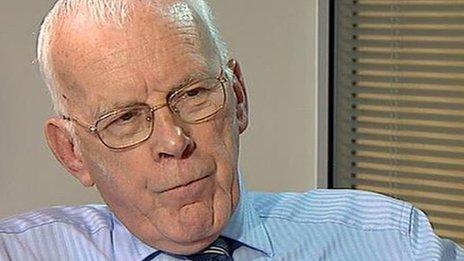Budget 2015: Chancellor overhauls North Sea taxes
- Published

Chancellor George Osborne has announced major changes to the North Sea tax regime, in response to difficulties facing the UK oil and gas sector.
In his Budget statement, he said Petroleum Revenue Tax (PRT) would be cut from 50% to 35% to support continued production in older fields.
The existing supplementary charge for oil companies will also be cut from 30% to 20%, backdated to January.
The move effectively reverses the hike in the 2011 Budget.
At that time oil prices were much higher.
Mr Osborne said the measures were worth a combined £1.3bn and were expected to boost North Sea oil production by 15% by the end of the decade.
The government will also invest in new seismic surveys of under-explored areas of the UK Continental Shelf (UKCS).
The measures follow repeated calls from oil industry leaders for a reduction in the tax burden for UK North Sea operators.
Hundreds of job losses have been announced in recent months, with companies citing rising production costs and the plunging price of oil as reasons for the cutbacks.
The Budget announcement came as new forecasts wiped £9.6bn off expected North Sea revenues over the next five years.
The Office for Budget Responsibility (OBR) downgraded its projections for oil receipts in 2016-17 from £2.4bn in December to £600m, with its forecasts for each of the five years to 2019-20 now less than £1bn.
'Essential lifeline'
Sir Ian Wood, who conducted a review of offshore oil and gas recovery for the UK government, said he believed the Budget provided "the essential lifeline" to enable the sector to start rebuilding confidence and investment in the UKCS.
He said: "Government are to be congratulated for recognising the need for this step change in the fiscal regime as essential to make the UKCS more internationally competitive.

Sir Ian Wood said the change to the fiscal regime was "essential"
"The supplementary charge reduction from 30% to 20% combined with the investment allowances undoubtedly improves the viability of a significant number of potential field developments and should get new field investment flowing as the oil price recovers.
"Hopefully, it will encourage the operators to keep their engineering teams working during this difficult downturn period to engineer the new field developments.
"The PRT reduction, which will take effect next year, is particularly helpful for the older fields and should encourage significant brownfield investment to ensure more optimum recovery from these older fields."
He added: "There will undoubtedly be job losses as the industry works its way through a very difficult price reduction, but these should be in the 5,000-10,000 range out of the 380,000 current jobs, and very significantly less than would have occurred under the previous fiscal regime."
'Sensible package'
Industry body Oil and Gas UK hailed the package as "sensible and far-sighted".
Chief executive Malcolm Webb said: "Today's announcement lays the foundations for the regeneration of the UK North Sea. The industry itself must now build on this by delivering the cost and efficiency improvements required to secure its competitiveness.
"These measures send exactly the right signal to investors. They properly reflect the needs of this maturing oil and gas province and will allow the UK to compete internationally for investment.
"We also welcome the government's support for exploration announced today.
"With exploration drilling having collapsed to levels last seen in the 1970s, the announcement of £20m for the newly formed Oil and Gas Authority to commission seismic and other surveys on the UK Continental Shelf is a very positive step."
Working conditions
The UK's biggest offshore trade union, Unite, said the industry must now end what it described as an "opportunistic assault" on North Sea jobs and conditions.
Pat Rafferty, the union's Scottish secretary, said: "We are clear that economic reform of the North Sea must go hand in hand with sustaining jobs and strengthening employment and workplace health safety rights.
"What we cannot contemplate is a deregulated future for the North Sea - a race to the bottom on jobs and standards where workers will have to work longer for less.
"Our challenge to the industry is this: You have got what you asked for, so stop attacking your workers' livelihoods and working conditions."
Dan Macdonald, founder of economic think tank N-56 and a former Yes Scotland advisory board member, said the proposed overhaul of the tax regime was a much-needed contribution to boosting the oil and gas sector.
'Great shame'
But he said: "It is a great shame however that the tax increases previously introduced by the chancellor, and the punitive tax burden it placed on the sector, had such a major impact, exacerbating the issue of global low oil prices and leading to the loss of thousands of jobs."
He also said it was disappointing that the chancellor did not act on N-56's call for government policy and decision makers responsible for oil and gas taxation and regulation to be relocated from London to Aberdeen.
Liz Cameron, chief executive of the Scottish Chambers of Commerce, said the tax cuts were "necessary" to reflect the challenges facing the oil and gas sector.
She said: "Together with a simplification of the tax allowance regime, this must be the start of a process to develop a strong and coherent fiscal plan for the North Sea that will help to ensure that Scotland and the UK continues to benefit from our natural resources in the long term."
Elsewhere in his Budget, Mr Osborne announced a 2% cut in duty on Scotch whisky and other spirits.
The Scotch Whisky Association welcomed the move, which it estimated would take 16p off the price of the average £12.90 bottle.